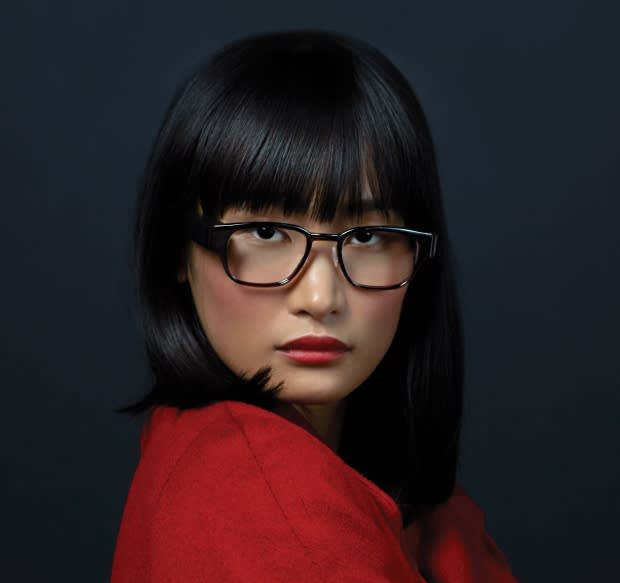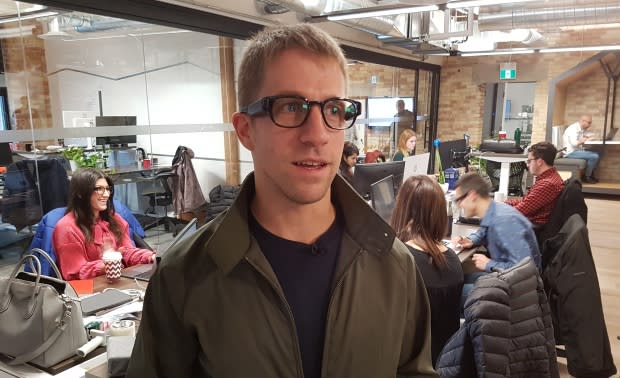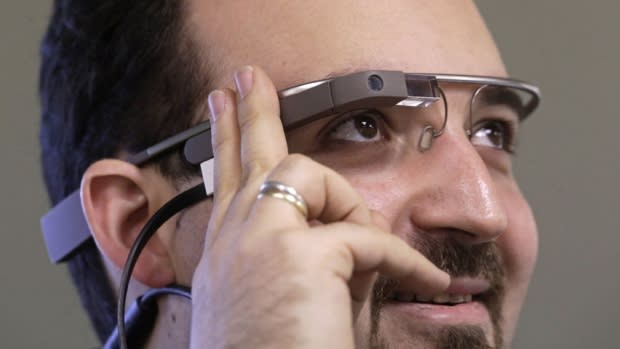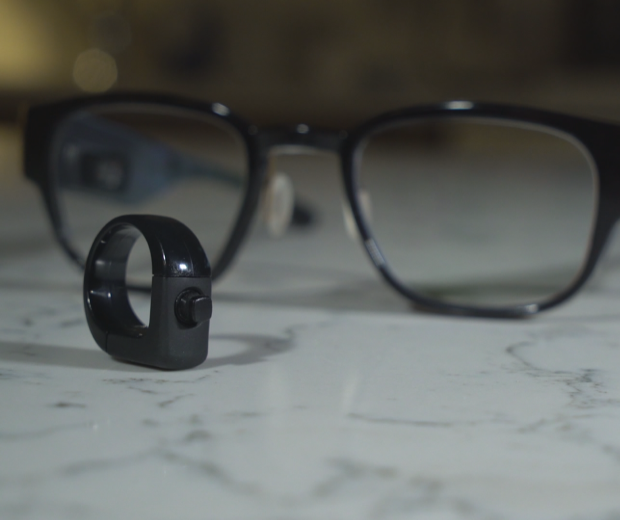Distracted too often by your smartphone? This company thinks it can help
Some of the best known companies in the world have tried — and failed — to market smartglasses to consumers, but a small Canadian company believes it's ready to show Google, Microsoft and Sony how it's done.
"There's a massive opportunity, really a mass-market opportunity, for a product like Focals to be successful," said Aaron Grant, co-founder of North, the Kitchener, Ont.-based firm that has launched Focals, a new brand of eyeglasses that will deliver smartphone functions via wearable technology.
A far-fetched boast? Maybe not. Both Amazon and Intel are among the investors who have poured $140 million US into North, formerly known as Thalmic Labs. The company has just opened retail stores in Toronto and Brooklyn, N.Y.
Grant and his partners are convinced there's potential for big sales to the growing number of smartphone users who are tired of being distracted by their devices.
"You pull it out to check the time, and the next thing you know you're scrolling through an endless list of apps," he said. "Things are being designed more and more to just kind of suck you in, and monopolize your attention."
'Subtle and discreet'
The idea behind Focals is that instead of reaching into a pocket or purse to check a smartphone, a user can wear what looks like regular prescription eyeglasses. A tiny projector and other technology are embedded in the arms of the glasses and users wear a type of ring that works like a joystick to navigate various tasks — without the need to look down.

Time, weather and calendar functions are accessible, as are email, texting and mapping functions. The glasses also work with Uber and Alexa, Amazon's voice assistant. Information is projected onto a small circle of holographic film on the right lens in a way that doesn't obscure the user's vision, and is invisible to others. Users can sit in a meeting or across a kitchen table and no one would know they were checking email.
"Subtle and discreet are good words to describe the overall approach to the product," said Grant, noting that a small blip of light will alert users to incoming emails and texts, but the glasses never demand immediate attention — users can choose to engage when it's convenient.
Geek culture
Recent history shows the venture is an expensive gamble.
Case in point: Google's spectacular fail with smartglasses. It launched Google Glass in 2012 with huge hype, including a widely publicized contest to be among the first eligible to buy the $1,500 product.

"It was associated with geek culture very quickly even though Google didn't want it to be," explains Isabel Pedersen, who holds the Canada Research Chair in Digital Life, Media and Culture, and has written a book about wearable technology.
She said Google's promotional campaign promised a sexy, exciting image for Glass users, but the product looked odd and appeared clumsy to use. It didn't take long to become the butt of jokes on late-night television, and was later mocked on an episode of The Simpsons.
Even so, that failure didn't dampen the desire of other companies to win over consumers to a more streamlined way to connect with the digital world. None have broken through to the mass market, however.
"In terms of wearable computing and wearable technology, smartglasses are the Holy Grail," said Pedersen. "Whatever company can get consumers to use and buy smartglasses will really make it."
Not cheap
Grant and his co-founders are all just 28 years old, and had previously caught the attention of the tech world when they released the Myo armband, a gesture recognition device that lets users control technology wirelessly, using muscle movements. The company now employs 450 people and has spent the last five years developing Focals, learning from the mistakes of bigger companies.

"Our everyday smartglasses product was designed to be a pair of eyewear first, and not a piece of technology first," explains Grant. "And I think that's super important for something that you're going to wear every day, and it's going to be part of your identity and how you express yourself."
There are just three styles of Focals, but unlike the unusual space-age design of Google Glass, all look like regular eyeglasses. An in-store fitting is required to ensure the holographic projector lines up with the wearer's eyes.
At $1,299, the whole package isn't cheap.
Privacy issues
"They're selling it as a luxury item," said Pedersen, who has already ordered a pair of Focals. "That means it's not going to be for 12-year-olds or 15-year-olds or maybe even people in their early 20s. I think they're looking for a customer between 35 and 65 who can afford it."
She also flags privacy issues as a potential stumbling block for Focals.

"We live in a datasphere that is using our data as a commodity," she said. "Focals' integration with large companies like Uber and Amazon presents the worry that there might be data implications. That's something about this new product that we don't understand yet."
Grant acknowledges that his team opted not to add a camera to the smartglasses due to privacy issues. "There's clear value from having a camera in smartglasses," he said. "But there are also obviously a ton of privacy concerns and social implications."
The more immediate challenge for the company though, is how to convince the world that this is the next step in the evolution of consumer technology; a product that will allow them to keep their eyes up, looking at the world around them, even as they access the many useful functions of a smartphone.
"I think it's just a mistake to think that smartphones are the best we can do, and that if we want the value they offer we have to live with this tradeoff that we're going to be forever distracted. Why does that have to be the case and why can't we do better?" asks Grant. "I think we can."
He and his partners are betting tens of millions of investors' dollars, years of effort, and the very survival of an ambitious little Canadian company, on the belief that he's right.

